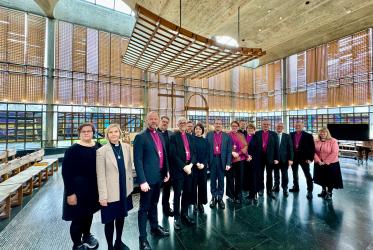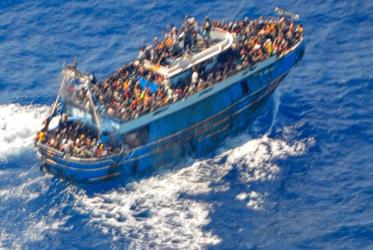Church of Greece
The "Church of Greece" emerged with the founding of the autocephalous Orthodox Church in Greece in 1850. Before that, it was an integral part of the Ecumenical Patriarchate of Constantinople. Christianity was first brought to the geographical area corresponding to modern Greece by the Apostle Paul, although the church's apostolicity also rests upon St Andrew who preached the gospel in Greece and suffered martyrdom in Patras (c. 66 AD), Titus, Paul's companion who preached the gospel in Crete where he became bishop, Philip who, according to the tradition, visited and preached in Athens, Luke the Evangelist who was martyred in Thebes, and John the Theologian who was exiled on the island of Patmos where he received the Revelation recorded in the last book of the New Testament. Thus Greece became the first European area to accept the gospel of Christ. Towards the end of the 2nd century the early apostolic bishoprics had developed into metropolitan sees in the most important cities. Such were the sees of Thessaloniki, Corinth, Nicopolis, Philippi and Athens. By the 4th century almost the entire Balkan peninsula constituted the Exarchate of Illyricum which was under the jurisdiction of the bishop of Rome until the time of Justinian I (527-65). Illyricum was finally assigned to the jurisdiction of the patriarch of Constantinople by the emperor in 732. From then on the church in Greece remained under Constantinople till the fall of the Byzantine empire to the Turks in 1453. As an integral part of the Ecumenical Patriarchate the church remained under its jurisdiction up to the time when Greece won her freedom from Turkish domination.
The Greek revolution of 1821-28, while leading to the liberation of southern Greece from the Turkish yoke, created anomalies in ecclesiastical relations. In 1850 the Endemousa Synod in Constantinople declared the Church of Greece autocephalous. The Church of Greece was originally entrusted to a synod, consisting of five members. The permanent president was the Metropolitan of Athens. In 1928 the Ecumenical Patriarchate issued a tome by which it ceded to the Church of Greece on a temporary basis 35 of its metropolitan dioceses in northern Greece. These, while still belonging to the jurisdiction of the Ecumenical Patriarchate, were placed under the administration of the Church of Greece.
Today the archbishop of Athens and All Greece presides over both a standing synod of twelve metropolitans (six from the new territories and six from southern Greece, who participate in the synod in rotation and on an annual basis), and a synod of the hierarchy (in which all ruling metropolitans participate), which meets once a year. There are two theological faculties, at the Universities of Athens and Thessaloniki. Priests are also educated at several theological schools and colleges.
Among the current concerns of the Church of Greece are the Christian response to globalization, the Christian approach to interreligious dialogue, and a common Christian voice within the framework of the European Union. The church has established a centre for bio-ethics to advise the holy synod on issues like euthanasia, in-vitro fertilization, cloning, etc., and most recently, has been involved in "Solidarity", a relief and development organization operating as an NGO. The Church of Greece hosted the WCC World Conference on Mission and Evangelism in Athens in 2005, the first in an Orthodox country in the history of this body.





